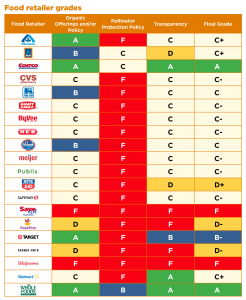31
Oct
Report Reveals Food Retailers Failing Pollinators
(Beyond Pesticides, October 31, 2016) Only three of the top 20 food retailers receive a passing grade when it comes to their pollinator protection policies, according to a report released by Friends of the Earth. Swarming the Aisles; Rating Top Retailers on Bee-Friendly and Organic Food takes a closer look at the policies and practices of food retailers across the country and creates an industry scorecard highlighting how each individual retailer fairs in categories like organics, pollinator protection, and pesticide reduction. While some individual chains performed well, overall the results indicate that food retailers have a long way to go to meet consumer demand when it comes to protecting pollinators and establishing organic policies.
Major retailers often lag behind public opinion when it comes to changing their official policies to promote practices that protect environmental interests. In 2 014, Friends of the Earth, Beyond Pesticides and allies released a report showing that 36 out of 71 (51 percent) of garden plant samples purchased at top garden retailers in 18 cities in the United States and Canada contain neonicotinoid (neonic) pesticides ”” a key contributor to recent bee declines, despite the fact more than half a million Americans had signed petitions demanding that Lowe’s and Home Depot stop selling neonics. While it took more than two years for Home Depot and Lowes to respond to consumer pressure, their eventual commitment to eliminate bee-toxic products was encouraging for consumers and environmental groups, who hope to see a similar shift in policy from grocery retailers.
014, Friends of the Earth, Beyond Pesticides and allies released a report showing that 36 out of 71 (51 percent) of garden plant samples purchased at top garden retailers in 18 cities in the United States and Canada contain neonicotinoid (neonic) pesticides ”” a key contributor to recent bee declines, despite the fact more than half a million Americans had signed petitions demanding that Lowe’s and Home Depot stop selling neonics. While it took more than two years for Home Depot and Lowes to respond to consumer pressure, their eventual commitment to eliminate bee-toxic products was encouraging for consumers and environmental groups, who hope to see a similar shift in policy from grocery retailers.
Smaller retailers have also taken notice and are working on removing neonics and other toxic pesticides from their shelves. Eldredge Lumber and Hardware in York, Maine, an ACE hardware store, has transitioned its shelves from harmful synthetic pesticides and fertilizers in favor of organic materials. Eldredge is encouraging consumers to employ alternatives by consciously stocking their shelves with organic compatible products. Efforts by local businesses to stock alternatives and educate consumers on their use is a wonderful example of creating change through grassroots efforts and a bottom-up approach.
New data from a YouGov Poll released alongside the report from Friends of the Earth, in partnership with SumOfUs, found that 80 percent of Americans believe it is important to eliminate neonicotinoids from agriculture. Among Americans who grocery shop for their household, 65 percent claim they would be more likely to shop at a grocery store that has formally committed to eliminating neonicotinoids. The poll also revealed that 59 percent of American grocery shoppers believe it is important for grocery stores to sell organic food, and 43 percent would be more likely to shop at a grocery store that sells more organic food than their current grocery store. All of these findings point to the fact that consumers are looking for grocery stores that not only offer organic alternatives, but that use their power in the market to advance policies that protect pollinators and eliminate the use of toxic pesticides.
The report reveals that while consumer demand for organic and pesticide-free food continues to show double-digit growth, only four of the top food retailers, Albertsons, Costco, Target (TGT) and Whole Foods, have adopted a publicly available company commitment to increase offerings of certified organic food or to disclose data on the current percentage of organic offerings or organic sales. In addition to these retailers, Aldi, Food Lion, part of the Delhaize Group (DEG), and Kroger (KR) disclosed data on the current percentage of organic offerings or organic sales. Moreover, none of the retailers have made a publicly available commitment to source organic from American farmers.
The primary sources of information for this scorecard include publicly available information, including company websites, company annual reports, SEC filings, corporate social responsibility and sustainability reports, press coverage and industry analyses. Sixteen of the top 20 food retailers were predominately unresponsive to Friends of the Earth’s requests for information via surveys, calls and letters. The report was not the first action taken by environmental organizations to put pressure on retailers to adopt more environmentally friendly sourcing policies, as a coalition of environmental groups, including Beyond Pesticides, sent a letter earlier this fall urging the food retailers to eliminate pollinator-toxic pesticides and increase USDA certified organic food and beverages to 15 percent of overall offerings by 2025, prioritizing domestic, regional and local producers.
For more on what you can do to help pollinators visit out Bee Protective program page. To assist local garden centers and hardware stores in transitioning their customers to organic practices, Beyond Pesticides has crafted the “Well-Stocked Hardware Store,” which provides the products and tools necessary to support a move to healthy, organic landscapes, and click here to watch Beyond Pesticides video Making the Switch. This guide fits in with Beyond Pesticides’ Model Pesticide Policy and Implementation Plan for Communities, but can be used independently for hardware stores and garden supply centers looking to encourage the use of products and practices that protect the health of their customers, community, and the wider environment.
Source: Friends of the Earth Press Release, Report
All unattributed positions and opinions in this piece are those of Beyond Pesticides










